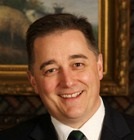By Bob Allen
The new president of the National Religious Broadcasters said Sept. 26 that Christian media can and should do a better job in countering the mainstream media’s message that same-sex marriage is OK.
“We have not got to live under some kind of self-imposed Sharia law on this issue,” Jerry Johnson, the former president of Criswell College selected last October as president and CEO of the international association of Christian broadcasters and communicators, said in a panel discussion at the Family Research Council’s Sept. 25-28 Values Voter Summit in Washington. “We have the First Amendment freedom to speak and to exercise, and we should use it.”
 Johnson, a Ph.D. graduate of Southern Baptist Theological Seminary who formerly served in senior administration at both the seminary in Louisville, Ky., and at Midwestern Baptist Theological Seminary in Kansas City, Mo., said the mainstream media has played a “huge” role in the campaign to redefine marriage.
Johnson, a Ph.D. graduate of Southern Baptist Theological Seminary who formerly served in senior administration at both the seminary in Louisville, Ky., and at Midwestern Baptist Theological Seminary in Kansas City, Mo., said the mainstream media has played a “huge” role in the campaign to redefine marriage.
“I think we should go back to 2008, probably when the president was elected the first time,” he said. “In his speech, you should remember, in the inauguration speech, he listed rich and poor, white and black, and then he inserted gay and straight in there. That was huge, and the media picked up on that.”
“Somewhere along in his presidency, he switched from gay and straight to LGBT,” he continued. “It’s a very interesting switch. I don’t know if anyone has marked that switch. He never says gay and straight any more. Now it’s LGBT. Straight’s not even in that mix. That’s an interesting point.”
Johnson said there are about 20 different sexual identities or orientations that would now want to be included as part of the mix. “The mainstream media keeps repeating this, writing it into scripts, repeating the lingo, and it is affecting us,” he said. “That’s the thing I want to say. Be very careful how you talk about these issues, because part of the debate is in the language itself.”
Discussing the marriage issue specifically with youth, Johnson said, “We just have to challenge a lot of these assumptions.”
“Young people always want to be on the cutting edge and with it, and so one of the main arguments you’ll hear is, ‘you don’t want to be on the wrong side of history.’ Well, let’s just take that for a moment. It’s not about history. It’s about the future. They’re not talking about history. They’re talking about what they want the future to be.”
Johnson said going back beyond the last few years, “history is on our side” when it comes to defending traditional marriage.
“In the last hundreds of years of American history our culture has recognized traditional, natural marriage,” he said. “That has been the cultural norm.”
“You go back beyond that, Judeo-Christian history, and I take a cue from the Apostle Paul,” he said. “In Romans 1 he didn’t quote the Leviticus passage we often hear. It’s true that it’s there, but Paul went back to Genesis 1, and Paul said this choice is a rejection of the Creator and the created order, the natural order.”
“When you use the word natural marriage, that’s Genesis 1,” Johnson said. “He made them male and female. So we’re talking about thousands of years of Judeo-Christian heritage here.
“What we do know is that cultures who have chosen this path in the past have not ended well, and the future is what they are talking about, not the past. So I think we’ve got to be biblical. We’ve got to be clear. We’ve got to be practical, and above all things we do have to talk about it, and let’s talk about protecting natural marriage.”
Johnson’s introduction in Southern Baptist life came in 1989 when, as a 24-year-old Southern Baptist minister from Colorado, he was the youngest person ever elected to serve on the Southern Seminary board of trustees.
In 1990 he circulated a 16-page document titled “The Cover-up at Southern Seminary” accusing faculty members including the president at the time, Roy Honeycutt, of “doctrinal infidelity.”
The most-quoted line of the document, discussed for more than four hours in executive session at the Southern Seminary trustee meeting in April 1990, was, “One would have to be as blind as a mole not to see that Dr. Honeycutt just does not believe the Bible.”
Previous story:
SBC leader says Honeycutt’s ‘holy war’ sermon was destined to fail
